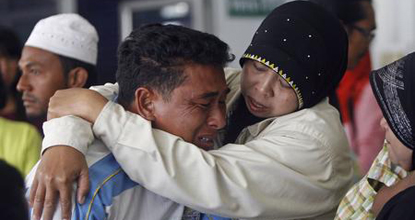
An 8-year-old boy was killed and 10 people were wounded by a bomb detonated in the heart of Pattani township on Thursday afternoon while Defence Minister Sukumpol Suwanatat was leading a press tour to the far South.

A police bomb squad member inspects the wreckage of a motorcycle destroyed in the bomb blast which killed a boy in Pattani on Thursday. (Photo by Parez Lohasan)
The explosion damaged the ice cream shop, seven cars and three motorcycles and shattered windows in 10 nearby buildings, including the probation office and police cooperative shop.
Ten people were reported wounded. An eight-year-old boy, identified as Nisofian Nisa-i, was confirmed killed.
Police blamed separatist insurgents.
ACM Sukumpol on Thursday morning led a group of news reporters and commentators to the South. He said he would show them the real situation and conditions in border provinces plagued by the insurgency.
He was accompanied by Deputy Interior Minister Pracha Prasopdee and Deputy Education Minister Sermsak Pongpanich.
In Yala, they were to attend an exhibition on the operations of the separatist group Barisan Revolusi Nasional-Coordinated (BRN-C) and get a briefing from Lt Gen Udomchai Thammasaroraj, the 4th Army commander and director of the Region 4 Internal Security Operations Command.
ACM Sukumpol said he wanted reporters to see how security forces perform their duty and the real conditions in troubled areas so they can report the situation more accurately.
A source in the working group for the Malaysia-brokered initiative to launch peace talks said the government had not completed the formation of a 15-man delegation for planned talks with BRN on March 28 on Malaysia's Langkawi island.
Although National Security Council (NSC) secretary-general Paradorn Pattanatabut, who will lead the Thai delegation, earlier said he had finished putting together the team, he had, in fact, only finished the job of deciding which sectors should be represented on it.
The selection of the 15 delegates had not been finalised. There were currently more than 15 people on the list to choose from, the source said.
Four police-military officials who took part in signing the dialogue agreement with the BRN in Kuala Lumpur on Feb 28, were already in the 15-member delegation. This includes Lt Gen Paradorn.
The three others already selected were Pol Col Tawee Sodsong, secretary-general of the Southern Border Provinces Administration Centre (SBPAC), Gen Nipat Thonglek, deputy permanent secretary for defence and Pol Lt Gen Saritchai Anekwiang, chief of the Special Branch Police.
According to the source, the other delegates were likely to represent the the following sectors, agencies or authoritative figures:
- The Internal Security Operations Command (Isoc). Unconfirmed reports said the agency had proposed Maj-Gen Nakrob Boonbuathong, deputy director-general of Isoc's 5th Operations Coordination Centre.
- King Prajadhipok's Institute. The name of Gen Ekachai Srivilas, director of the institute's Office of Peace and Governance, emerged in some media reports as a delegate.
- A representative of the Chularatchamontree, the Thai Muslim community leader.
- A representative of the 4th Army commander.
- A representative of the press.
- A representative of governors of the three southern border provinces. The three governors may select one person to represent them.
- A representative of Thai Buddhists.
- A representative of women's groups.
- A representative of civic groups.
- A representative chosen from law experts and academics.
The source said the 15 delegates would be selected from those who work or live in the far South.
More than one representative would come from some sectors, and the working panel may call a meeting and ask them to choose a person to represent them. It may increase or reduce the number of representatives in certain sectors, such as integrating a teacher representative with the Thai Buddhists group.